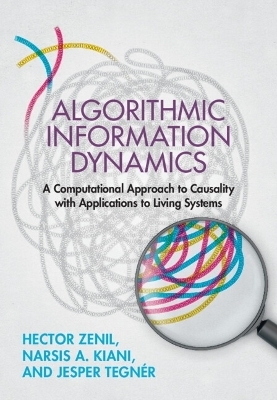
Algorithmic Information Dynamics
Cambridge University Press (Verlag)
978-1-108-49766-4 (ISBN)
Biological systems are extensively studied as interactions forming complex networks. Reconstructing causal knowledge from, and principles of, these networks from noisy and incomplete data is a challenge in the field of systems biology. Based on an online course hosted by the Santa Fe Institute Complexity Explorer, this book introduces the field of Algorithmic Information Dynamics, a model-driven approach to the study and manipulation of dynamical systems . It draws tools from network and systems biology as well as information theory, complexity science and dynamical systems to study natural and artificial phenomena in software space. It consists of a theoretical and methodological framework to guide an exploration and generate computable candidate models able to explain complex phenomena in particular adaptable adaptive systems, making the book valuable for graduate students and researchers in a wide number of fields in science from physics to cell biology to cognitive sciences.
Hector Zenil is a senior researcher at the Alan Turing Institute, British Library, researcher at the Department of Chemical Engineering and Biotechnology, University of Cambridge and the leader of the Algorithmic Dynamics Lab at the Karolinska Institute in Sweden. Previous positions include Computer Science faculty member at the University of Oxford, NASA Payload team member for the Mars Gravity Biosatellite at the Massachusetts Institute of Technology, and researcher at the Evolutionary and Behavioural Theory Lab at the University of Sheffield. He helped develop the factual answering Artificial Intelligence engine behind Siri and Alexa at Wolfram Research. He has published over 120 peer-reviewed papers, edited six books, is Editor of the journal Complex Systems, and the author of Methods and Applications of Algorithmic Complexity (2022). Narsis A. Kiani is a senior researcher at the Department of Oncology-Pathology and Lab leader at the Algorithmic Dynamics Lab, Center for Molecular Medicine, Karolinska Institute in Stockholm, Sweden. She received a BEng in medical engineering and a BSc in pure mathematics (Amirkabir University of Technology (Polytechnic of Tehran), MSc (Kharazmi University), and Ph.D. in applied mathematics (Tehran Science & Research Branch Azad University). She was Vinnova-Marie Curie fellow at Karolinska Institute (2014) and held a postdoctoral position at BioQuant, Heidelberg University. She is the co-editor of Networks of Networks in Biology: Concepts, Tools and Applications (2021). Jesper Tegnér is a Professor of Bioscience and Computer Science at King Abdullah University of Sciences and Technology and Adjunct Chaired Strategic Professor of Computational Medicine at Karolinska Institute. He was awarded a Research Fellowship position from the Alfred P. Sloan Foundation (USA). Dr. Tegnér was recruited to the first Chaired Full Professorship in Computational Biology (Dept. of Physics) in Sweden 4.5 years (February 2002) after completing his Ph.D. Since January 2010 he is a Strategic Professor Computational Medicine at Center for Molecular Medicine, Director for the Unit of Computational Medicine, Dept. of Medicine, Solna Karolinska Institutet and Karolinska University Hospital.
Introduction; Part I. Preliminaries: 1. A computational approach to causality; 2. Networks: from structure to dynamics; 3. Information and computability theories; Part II. Theory and Methods: 4. Algorithmic information theory; 5. The coding theorem method (CTM); 6. The block decomposition method (BDM); 7. Graph and tensor complexity; 8. Algorithmic information dynamics (AID); Part III. Applications: 9. From theory to practice; 10. Algorithmic dynamics in artificial environments; 11. Applications to integer and behavioural sequences; 12. Applications to evolutionary biology; Postface; Appendix: Mutual and conditional BDM; Glossary.
| Erscheinungsdatum | 16.05.2023 |
|---|---|
| Zusatzinfo | Worked examples or Exercises |
| Verlagsort | Cambridge |
| Sprache | englisch |
| Maße | 175 x 250 mm |
| Gewicht | 790 g |
| Themenwelt | Informatik ► Theorie / Studium ► Algorithmen |
| Naturwissenschaften ► Biologie ► Genetik / Molekularbiologie | |
| ISBN-10 | 1-108-49766-7 / 1108497667 |
| ISBN-13 | 978-1-108-49766-4 / 9781108497664 |
| Zustand | Neuware |
| Informationen gemäß Produktsicherheitsverordnung (GPSR) | |
| Haben Sie eine Frage zum Produkt? |
aus dem Bereich


